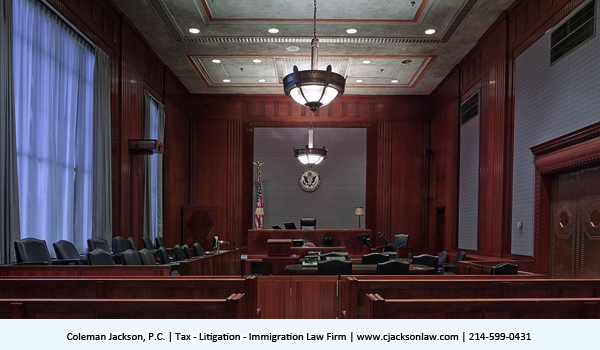Coleman Jackson, P.C. | Transcript of Legal Thoughts
LEGAL THOUGHTS
SERIES: LITIGATION IN TEXAS
EPISODE 1: LITIGATING YOUR CASE IN TEXAS
Listen:
Legal Thoughts is an audiocast presentation by Coleman Jackson, P.C., a law firm based in Dallas, Texas serving individuals, businesses, and agencies from around the world in taxation, litigation, and immigration legal matters.
This episode of Legal Thoughts is an audiocast where the Attorney, Coleman Jackson is being interviewed by Johana Powell, Tax Legal Assistant of Coleman Jackson, P.C. The topic of discussion is “LITIGATING YOUR CASE IN TEXAS”. You can listen to this podcast by clicking here:
If you enjoy this podcast, make sure to stay tuned for more episodes from the taxation, litigation, and immigration Law Firm of Coleman Jackson, P.C. Be sure to subscribe. Visit the taxation, litigation and immigration law firm of Coleman Jackson, P.C. online at www.cjacksonlaw.com.
TRANSCRIPT:
ATTORNEY: Coleman Jackson
LEGAL THOUGHTS
COLEMAN JACKSON, ATTORNEY & COUNSELOR AT LAW
ATTORNEY: Coleman Jackson
Welcome to Legal Thoughts
My name is Coleman Jackson and I am an attorney at Coleman Jackson, P.C., a taxation, litigation and immigration law firm based in Dallas, Texas.
In addition to myself, we have Alexis Brewer and Johana Powell – Tax Legal Assistants, Leiliane Godeiro – Litigation Legal Assistant, and Gladys Marcos – Immigration Legal Assistant.
On today’s “Legal Thoughts” podcast, our Litigation Legal Assistant, Leiliane Godeiro will be interviewing me on the important topic of: “Litigating your case in Texas.”
This is a series of podcasts about Litigation in Texas, and this is the first episode.
INTERVIEWER: Leiliane Godeiro, Litigation legal assistant
Hi everyone, my name is Leiliane Godeiro and I am a Litigation Legal Assistant at the tax, litigation and immigration law firm of Coleman Jackson, Professional Corporation. Our law firm is located at 6060 North Central Expressway, Suite 620, right here in Dallas, Texas.
Good afternoon, Attorney; thank you for being here today to talk about this important topic about: Litigating your case in Texas.”
We will be doing a series about litigation in business contracts and this is the first episode.
Let’s jump right into this!
Question 1:
Attorney when is it worth it to litigate my case?
Attorney Answer – Question 1:
Good afternoon Leiliane.
To determine if litigating a case is worth the time and the resources to spend, lawyers and clients must evaluate certain factors.
Usually, when a client consults for a first time in my office the questions are:
Is there a breach of a contract you celebrated? If yes, is there any way you can prove the liability? how have you been damaged in consequence of an action of the other party? Is it likely you will obtain the outcome desired? Is there an insurance to your contract or the opposing party have the assets to support the outcome of the case?
Then, when all these factors are evaluated and we outweigh with the client all the possibilities and whether it is worth it to pursue litigation the preparation of the case starts. This decision is case by case basis, there is no answer in general to this question, that is the reason you must consult a lawyer to evaluate your options.
INTERVIEWER: Leiliane Godeiro, Litigation legal assistant
Question 2:
How much should be the liability for a case to be worth litigating?
Attorney Answer – Question 2:
Leiliane, in Texas we have what we call county justice of the peace courts where people can litigate small claims. This is an informal setting where parties can represent themselves instead of hiring an attorney, which is costly and sometimes not necessary. However, there is a limit for these small claims and it is $20.000. Then if your dispute is a bigger amount than that you must hire a lawyer.
INTERVIEWER: Leiliane Godeiro, Litigation legal assistant
What is a liability and what happens when a business’s owner has been damaged as a result of another party action?
Attorney Answer – Question 3:
First of all, in simple terms a liability is the legal responsibility for one’s acts or omissions.
Then, there may be disputes for contractual, insurances, business torts, commercial sales, creditor’s rights, intellectual property, and intra-company issues, among others.
Therefore, to start the business owner must identify the real issue that has caused the damage to your company, how much are your losses and if you can prove it.
For example, if your business has a contract with a third party for supplies and they did not provide them according to the contract that would be a breach of contract, if you have lost more than $20.000 you must hire a lawyer, but you should evaluate whether it is worth it according to the time you will spend in litigation and the amount of money you will have to pay to resolve it.
There are many types of controversies regarding businesses, a breach of contract is just one of the theories in business litigation and the disputes mentioned before. You must consult with a lawyer to identify better what applies to your case.
INTERVIEWER: Leiliane Godeiro, Litigation legal assistant
QUESTION 4:
Attorney Jackson, in the case of a business’ owner that must hire a lawyer because the amount in controversy exceeds the $20.000, but the business is being harmed from the continuous conduct of a party. What remedies are available while a lawsuit is ongoing and what is the result?
Attorney Answer – Question 4:
When a business has an issue with a third party that is ongoing and they want to sue that party, but that would not be enough to stop having losses while the lawsuit is its course, the remedy available is an injunction.
An injunction is an immediate remedy that the courts order to refrain the other party to take certain actions. It can be temporary, preliminary or permanent.
A temporary injunction is used to preserve the status quo and protect the plaintiff from being injured until the court can hold a hearing on the case, it is mostly used in emergency cases and is an early decision from the judge in the lawsuit to stop the defendant from conducting harmful actions.
A preliminary injunction works the same way as the temporary injunction but it is issued when the case is pending of a final resolution of a lawsuit.
Lastly the permanent injunction is a final order from the court when monetary damages are not enough.
Lastly, the result is stop the other party from conducting harmful actions against the business and also the objective when requesting an injunction.
INTERVIEWER: Leiliane Godeiro, Litigation legal assistant
Question 5:
What do business’ owners have to consider to seek an injunction?
Attorney Answer – Question 5:
Business’ owners must consider whether an injunction is an appropriate remedy according to the specific facts of the case. Courts usually grant injunctions to stop the defendants from actions that cause or is likely to cause irreparable harm to the plaintiff. There are specifics disputes for which is appropriate to seek an injunction, so business’ owners must consult with a lawyer to get advice regarding this remedy.
Temporary injunctions and preliminary injunctions are of equitable nature, business’ owners must prove that they are likely to success in the merits of their lawsuit, and show that an irreparable harm will be caused if the relief is not granted.
Moreover, with regards to seeking a permanent injunction, as it is a final order from the court, the plaintiff must prove that money damages are an inadequate remedy and will not suffice to avoid suffering irreparable harm.
INTERVIEWER: Leiliane Godeiro, Litigation legal assistant
Attorney, thank you for being here today with us, this information about litigation was very interesting and useful for our clients and listeners.
Concluding: owners of business in Texas have opportunities to be heard and litigate their cases to protect the interest of their companies even if the amount in controversy is not high, but if it is you must contact your lawyer.
Our listeners who want to hear more podcast like this one should subscribe to our Legal Thoughts Podcast on Apple Podcast, Google Podcast, Spotify or where ever you listen to your podcast. Everybody takes care! And come back in about two weeks, for more taxation, contracts, litigation and immigration Legal Thoughts from Coleman Jackson, P.C., located right here in Dallas, Texas at 6060 North Central Expressway, Suite 620, Dallas, Texas 75206.
English callers: 214-599-0431 | Spanish callers: 214-599-0432 |Portuguese callers: 214-272-3100
Attorney Closing Remarks
Thank you all for giving us the opportunity to inform you about: “Litigating your case in Texas.”
Remember this is a series of podcast about business litigation. This is our first episode.
If you want to see or hear more taxation, contract litigation and immigration LEGAL THOUGHTS from Coleman Jackson, P.C. Subscribe to our Legal Thoughts Podcast on Apple Podcast, Google Podcast, Spotify or wherever you listen to your podcast.
Stay tuned! We are here in Dallas, Texas and want to inform, educate and encourage our communities on topics dealing with taxation, litigation and immigration. Until next time, take care.





